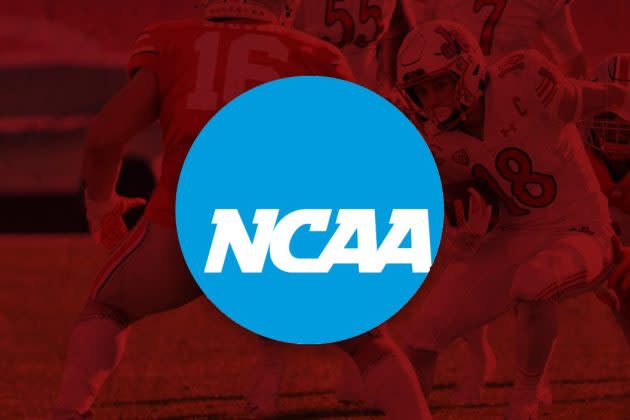NCAA to Allow Sports Betting Data Deals for Schools, Conferences

The NCAA is further loosening its long-held opposition to sports betting, paving the way for individual schools and conferences to sign lucrative deals with data companies that sell that information on to sportsbooks.
The Division I Interpretations Committee met Wednesday to discuss the topic, and determined that an individual, school or conference can provide stats to sports wagering companies if that information is also available to the general public, according to an NCAA spokesperson. Membership was informed of the ruling Thursday afternoon.
More from Sportico.com
Sporticast: Military Mulls College Sports Takeover, Mark Emmert Steps Down
Military Mulls Massive Recruiting Plan to Enlist College Athletes
NCAA President Emmert Agrees to Step Down in College Sports Surprise
The decision will likely open the door for conferences large and small ( and maybe individual schools themselves) to capitalize directly on the rush of money being spent by betting operators and data middlemen as more states legalize gambling on pro and college games.
The move comes amid major changes inside college sports and its main governing body. As new NIL rights, anti-trust lawsuits and conference realignment take center stage, the NCAA is increasingly ceding more rule-making and enforcement obligations to individual divisions or conferences. The upheaval claimed a high-profile job this week, as NCAA president Mark Emmert agreed to leave his role in the middle of his contract, giving the association a chance to assess its future under new leadership.
The NCAA’s memo is a response to a formal rules interpretation request filed earlier this year by the Mid-American Conference, which was looking for clarity about the organization’s sports betting restrictions. More specifically, the conference asked about Section 10.3 of the NCAA’s Division I manual, which states that athletes, university staffers and conference employees cannot “provide information” to anyone associated with sports wagering. That sentence could be interpreted as forbidding conferences from signing pricey data distribution deals.
Those deals have become one of the prominent ways that pro leagues like the NBA and NFL are profiting off the booming U.S. sports betting industry, and the MAC took a major steps toward replicating them last month, when it inked a wide-ranging deal with Genius Sports. That partnership doesn’t allow Genius to sell data to sportsbooks right now, according to someone familiar with the status, but that could change now that the NCAA has provided more clarity.
It’s unclear what Genius agreed to pay the MAC, but it will pale in comparison to what the biggest college conferences, like the Big Ten and SEC, could make from similar deals. Their football and basketball games are often more popular (and attract more bettors) than established U.S. pro leagues. Bidding that led to the NHL’s recent deal with Sportradar, for example, eclipsed $250 million, and the league’s eventual deal included the right to purchase about around $90 million worth of equity.
This is just the latest area where the Indianapolis-based governing body appears to be loosening its grip on how college sports is governed and policed. In January the NCAA approved a new slimmed-down constitution that will cede more control to individual divisions, and likely to individual conferences themselves. That came as the NCAA faces public, legal and legislative challenges to its long-held version of amateurism.
For decades the NCAA and the major U.S. leagues fought the push for more legal sports betting in America, citing fears over the integrity of their games. The seminal case on the issue, Murphy v. NCAA, eventually landed at the Supreme Court, and in May 2018 the court struck down the federal ban on sports betting.
Professional leagues like the NBA, NFL and NHL were quick to reverse course, signing lucrative commercial deals with operators, and data deals that give them a second revenue stream. The NFL’s partnerships in those two realms include at least $2 billion worth of cash and equity. The NCAA, however, has been slow to adapt. There is no official sports betting partner of the NCAA, and its current data deal with Genius Sports only covers media, not distribution to sports books. At the governing body’s annual convention in 2019, Emmert told hundreds of college administrators that sports betting will “threaten the integrity of college sports.”
That said, the NCAA has already made subtle moves in this direction. In January 2020, the Division I council voted to change its legislation to eliminate a paragraph that explicitly restricted advertising from “organizations promoting gambling” at championship events. The language was moved—and watered down—to give the NCAA more flexibility to align its rules with those of the pro sports leagues.
College sports are more susceptible to match-fixing than the NFL or NBA. The players are compensated significantly less, and beyond major conferences like the Big Ten or SEC, there are dozens of smaller leagues and smaller schools where there is significantly less oversight.
That said, college sports has gradually warmed to the industry on the edges. UNLV and Nevada, the only two Division I schools in a state with comprehensive legal sports betting prior to the Murphy decision, have long allowed casinos with sportsbooks to advertise at games.
More recently a handful of schools like Colorado, LSU and Maryland have begun signing broader partnerships with sportsbooks. Colorado’s deal, with PointsBet, pays the Buffaloes at least $1.625 million over the five-year term, plus a $30 referral fee for every new customer the school directs to PointsBet, according to the contract.
Last year the Fiesta Bowl signed a partnership with Caesars (Nasdaq: CZR) that included a fan lounge at the game and title sponsorship to some live events. The 2022 Final Four was played in Caesars Superdome in New Orleans, where the NCAA covered some advertising but didn’t directly avoid using the building’s full name.
Best of Sportico.com
